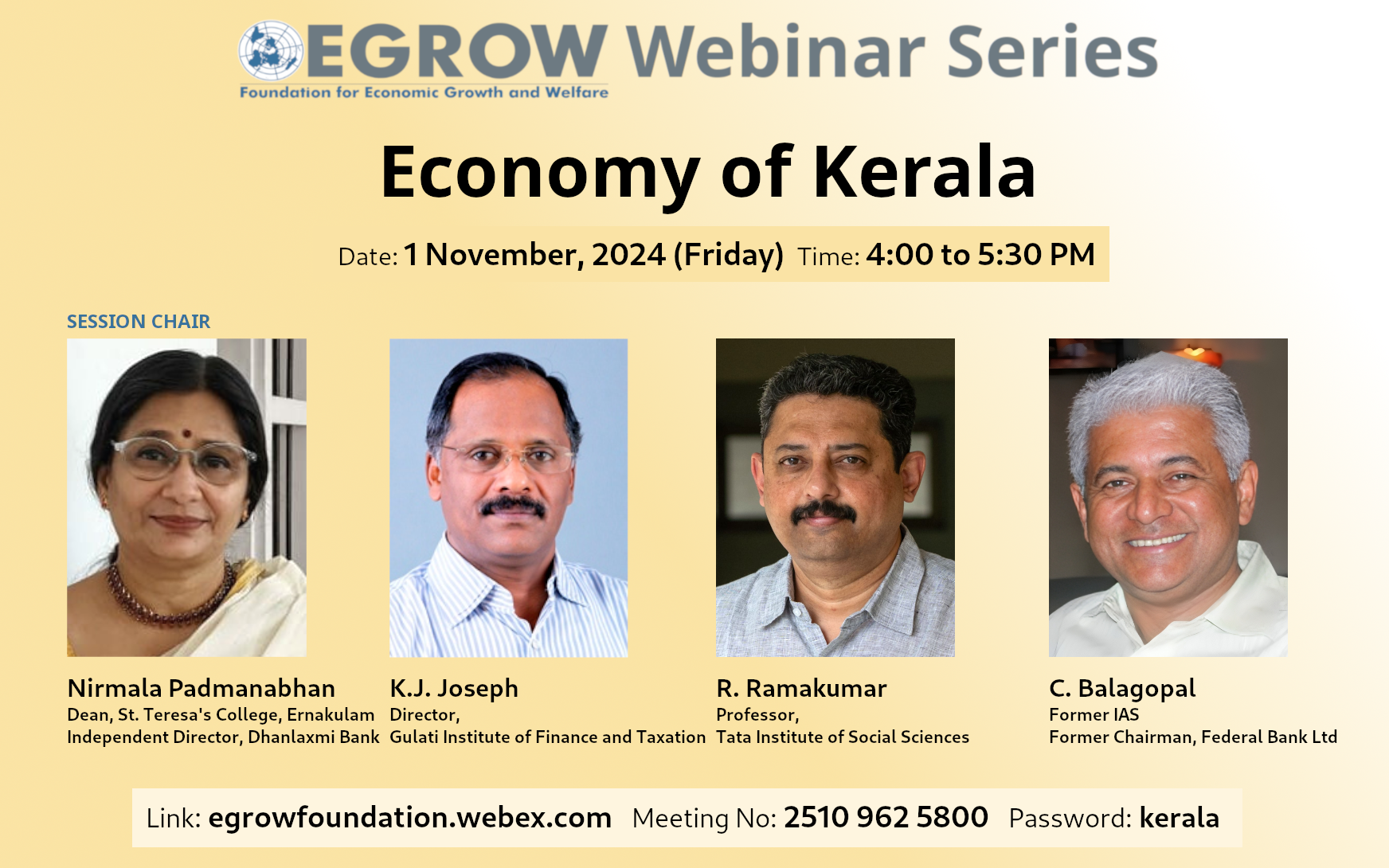Economy of Kerala

Webinar Link
Meeting No: 2510 962 5800
Password: kerala
Certificate of Participants
To recieve certificates, please register and attend
Abstract
The webinar will examine the economic landscape of Kerala, the 9th largest economy in India, which contributes over 4% to the national GDP despite representing only 2.8% of India's population and 1.2% of its land area. The Gross State Domestic Product (GSDP) for 2024-25 (at current prices) is projected at Rs 13,11,437 crore, reflecting an impressive growth of 11.7% over 2023-24. The panel shall provide critical insights into sectoral performances, fiscal strategies, and the overall trajectory of Kerala's economy, emphasizing sustainable development and future opportunities for growth.
About the Speakers
Nirmala Padmanabhan
Nirmala Padmanabhan was a faculty of Economics for 26 years for post-graduation and graduation and has handled subjects such as financial markets and systems, international trade and monetary systems. She has experience in budget analysis and analysis of economic issues of the country and in rural economic development as part of the Unnath Bharath Abhiyan / community development projects. Presently, she is the Dean of Extension and Incubation in St. Teresa's College, Ernakulam with overall charge of community development projects undertaken by the college and responsible for overall guidance to the business incubation and entrepreneurship development initiatives of the college.
She was Member of the Public Expenditure Review Committee of the Government of Kerala in 2020-21. She was also a Member of the Working Group on Gender and Development to prepare Plan of Action for 14 Five Year Plan of the Government of Kerala in 2021-22. She was also a Member of the Working Group on Financial Resource Mobilisation to prepare Plan of Action for 14 Five Year Plan of the Government of Kerala in 2021-22. Dr. Nirmala Padmanabhan is a Director in and holds 6.94% of the paid-up capital of BhuME Women's Collective Pvt. Ltd. Dr. Nirmala Padmanabhan is a post graduate in economics and holds a doctorate and has special knowledge and practical experience in economics.
K.J. Joseph
KJ Joseph is currently the Director of the Gulati Institute of Finance and Taxation (GIFT). He is also the President of Globelics and Founding Editor-in-Chief of Innovation and Development published by Taylor and Francis (London). Earlier positions that he held include Ministry of Commerce Chair Professor at Centre for Development Studies, Visiting Senior Fellow at RIS, New Delhi, Professor Jawaharlal Nehru University, IT Policy Consultant of UNESCAP for Cambodia, Laos, Myanmar, Vietnam, Thailand and the Yunnan Province of China, Expert in Innovation studies at Tianjin University of Finance and Economics, China, selected under the program of search for global experts. He has also been a consultant to UNCTAD. His areas of expertise include science technology and innovation for development with a focus on information technology, industry studies especially electronics; FDI, trade, globalization and WTO, regional development with a focus on Kerala economy and natural resource-based development with a focus on plantation agriculture. Apart from over 80 research papers and a number of policy-oriented reports, he has six books published by five leading international publishers (Sage publications, Oxford University Press, Palgrave Macmillan, Routledge and Edward Elgar) to his credit. He has delivered invited lectures, keynote addresses and presented papers in over 80 seminars/conferences held in 35 countries and over 125 seminars/workshops/conference in India.
R. Ramakumar
R. Ramakumar is an economist and a Professor with the School of Development Studies, Tata Institute of Social Sciences (TISS), Mumbai. Trained as an undergraduate and postgraduate in agricultural science, he received his PhD in Quantitative Economics from the Indian Statistical Institute, Kolkata. He also serves as an expert member in the Kerala State Planning Board in the State of Kerala in India. Previously, he was the NABARD Chair Professor at TISS as well as the Dean of the School of Development Studies. He has held visiting appointments at the London School of Economics and Political Science, University of Zurich, Queen Mary University of London, and Goa University. He is also a member of the Research Programmes Committee, Indian Society of Agricultural Economics, and of the editorial board of the journal Review of Agrarian Studies.
His work has largely been on Indian economy, agrarian studies, and agricultural economics, with special focus on rural banking and agricultural research. His most recent book is Distress in the Fields: Indian Agriculture after Liberalisation published in 2022.
C. Balagopal
Mr Balagopal is the former Chairman of the Board of Federal Bank Ltd. He is also a Trustee of Anaha Trust; Member of the Governing Council of the Centre for Management Development, Trivandrum; Member of the Advisory Board of Fourth Wave Foundation; Member of the Board of TIMed Medical Devices Incubator of SCTIMST. Balagopal Chandrasekhar completed his BA and MA from Loyola College, Madras University, and joined the IAS in 1977 and worked in Manipur and Kerala. In 1983 he resigned from the IAS to promote a venture to make hi-tech biomedical devices for the first time in the country. Acquiring the knowhow from Sree Chitra Tirunal Institute for Medical Sciences & Technology, Trivandrum (SCTIMST) and with the support of National Research Development Corporation and KSIDC, he set up his venture, Penpol Ltd, near Trivandrum. In 1999, Penpol entered into a joint venture with the Terumo Corporation of Japan. Today, Terumo Penpol Ltd is the biggest manufacturer of blood bags in India and one of the world’s biggest makers of high-tech bio-medical devices. In 2012, he sold his stake in the company and turned to investing in startups, mentoring entrepreneurs, writing (four books to his credit), travel, and his many other interests. Mr Balagopal runs a Trust, which supports social projects in Kerala and Manipur in primary health, primary education, and rural livelihoods.